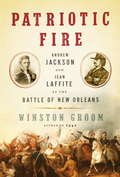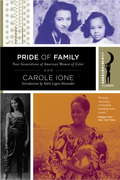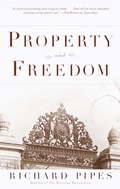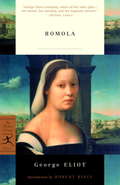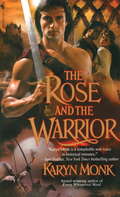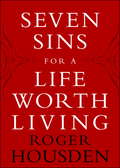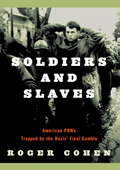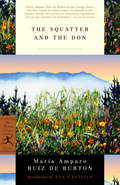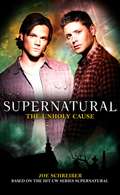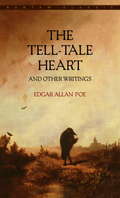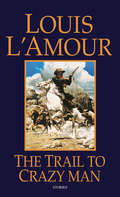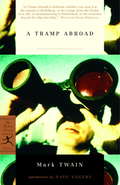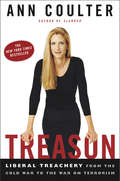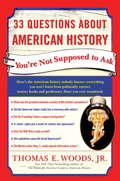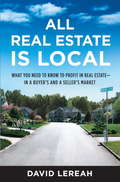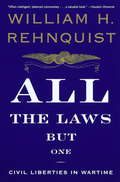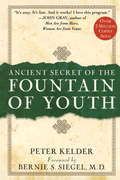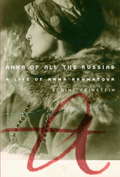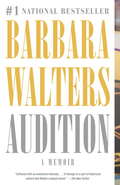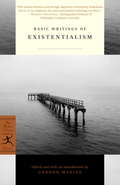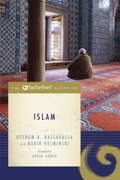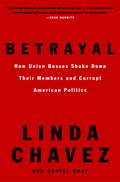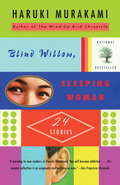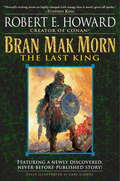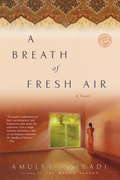- Table View
- List View
Patriotic Fire: Andrew Jackson And Jean Laffite At The Battle Of New Orleans (Playaway Adult Nonfiction Ser.)
by Winston GroomGroom recounts the Battle of New Orleans, in which Andrew Jackson joined French pirate Jean Lafitte to fight against the British invasion of the city in December of 1814. He discusses what led up to the battle, its stages, Jackson's and the British strategy, and how the British tried to recruit Lafitte. Groom is the author of 13 other books on historical and fictional subjects, including Forrest Gump, and was nominated for a 1984 Pulitzer Prize. Annotation ©2006 Book News, Inc. , Portland, OR (booknews. com)
Pride of Family
by Carole IoneRemarkable&Engrossing&Ione had made an important contribution to both the literature of race and the literature of women in America. Susan Wood, Washington Post Book World
Property and Freedom
by Richard PipesProperty, asserts Richard Pipes, is an indispensable ingredient not only of economic progress but also of liberty and the rule of law. In his new book, the Harvard scholar demonstrates how, throughout history, private ownership has served as a barrier to the power of the state, enabling the Western world to evolve enduring democratic institutions. He traces the development of private property, beginning with ancient Greece and Rome, where property rights in the modern sense first made their appearance. He explains how notions of ownership matured in late medieval times with the great expansion of commerce and the growth of cities. He shows how England, as the first country to treat land as a commodity and to develop a robust defense of property rights, also became the first to institute a parliamentary government capable of restraining the powers of royalty. In pre-nineteenth-century Russia, on the other hand, the absence of private land ownership deprived its citizens of the leverage to limit the authority of their tsars. Pipes describes the attitudes toward property of twentieth-century totalitarian states and points out that in the United States the protection of private property, rooted in the principles of the Founding Fathers, has been a major contributor to the commonweal. However, he warns that contemporary trends in the treatment of property--in a century that, he suggests, has been unfavorable to the institution--threaten to undermine the rights of citizens. And he makes clear why he believes that excessive interference by government, even when intended to promote the "common good," could lead to a diminution of freedom.
Romola
by George EliotOne of George Eliot's seven classic novels. She is best known for Middlemarch, Silas Marner, and The Mill on the Floss. According to Wikipedia: "Mary Ann (Marian) Evans (22 November 1819 â " 22 December 1880), better known by her pen name George Eliot, was an English novelist. She was one of the leading writers of the Victorian era. Her novels, largely set in provincial England, are well known for their realism and psychological perspicacity. She used a male pen name, she said, to ensure that her works were taken seriously. Female authors published freely under their own names, but Eliot wanted to ensure that she was not seen as merely a writer of romances. An additional factor may have been a desire to shield her private life from public scrutiny and to prevent scandals attending her relationship with the married George Henry Lewes. "
The Rose and the Warrior
by Karyn MonkIn the breathtaking tradition ofOnce a WarriorandThe Witch and the Warriorcomes Karyn Monk's passionate new tale of a distant time, a proud people--and a forbidden love. She was an infamous thief. . . When the ruthless MacTiers destroyed Melantha's clan, she vowed to do whatever was necessary to keep her people alive. It was a daring risk to disguise herself as "the Falcon," a mysterious horseman who stole food and gold from the enemy, always slipping away unscathed. But when Melantha captured the MacTier warrior who was sent to kill her, the danger she faced was the desire aroused by this enigmatic stranger. . . . . . . until one man stole her heart. Roarke had known only battle for far too long. With his family gone, he had proved his loyalty to his laird in countless conflicts, fighting with the fearless arrogance of a man who had nothing to lose--and untold rewards to gain. But murdering the enchanting spitfire who had waged her own maddening war against his clan was unthinkable. Torn between fealty to his lord and the dictates of his conscience, Roarke would look for an answer in the emerald eyes of a woman who dared to show him the meaning of honor, the bonds of family--and the power of love.
Seven Sins for a Life Worth Living
by Roger Housden“Conventional wisdom,” says Roger Housden, “tells us that nobody goes to heaven for having a good time. ” Seven Sins for a Life Worth Living, then, is a refreshing, liberating, and decidedly welcome dose of unconventional wisdom that awakens us to the simple delights and transformative joys of the world around us. With elegance, gentle humor, and remarkable openness, Housden takes us along as he recalls his personal journey toward an appreciation of what he calls the Seven Pleasures: The Pleasure of All Five Senses, The Pleasure of Being Foolish,The Pleasure of Not Knowing, The Pleasure of Not Being Perfect, The Pleasure of Doing Nothing Useful, The Pleasure of Being Ordinary, and The Pleasure of Coming Home. Housden writes, for instance, of submitting to the ultimate folly of falling in love, of celebrating our imperfections, of coming to understand the virtues of the Slow Food movement while enjoying an all-afternoon lunch in a small French village, and of discovering in a Saharan cave that, however extraordinary our surroundings, “we are human, a glorious nothing much to speak of”—and learning to be at peace with the notion. Such pleasures may be suspect in today’s achievement-driven, tightly scheduled, relent-lessly self-improving, conspicuously consumptive culture, but surely the greater sin lies in letting them slip away moment by precious moment. “The purpose of this book,” says Housden, “is to inspire you to lighten up and fall in love with the world and all that is in it. ” Reading it is a pleasure indeed. “When you die,God and the angels will hold you accountablefor all the pleasures you were allowed in life that you denied yourself. ” Roger Housden, author of the bestselling Ten Poems series, presents a joyously affirmative, warmly personal, and spiritually illuminating meditation on the virtues of opening ourselves up to pleasures like being foolish, not being perfect, and doing nothing useful, the pleasure of not knowing, and even (would you believe it?) the pleasure of being ordinary. From the Hardcover edition.
Soldiers and Slaves
by Roger CohenIn February 1945, 350 American POWs captured earlier at the Battle of the Bulge or elsewhere in Europe were singled out by the Nazis because they were Jews or were thought to resemble Jews. They were transported in cattle cars to Berga, a concentration camp in eastern Germany, and put to work as slave laborers, mining tunnels for a planned underground synthetic-fuel factory. This was the only incident of its kind during World War II. Starved and brutalized, the GIs were denied their rights as prisoners of war, their ordeal culminating in a death march that was halted by liberation near the Czech border. Twenty percent of these soldiers–more than seventy of them–perished. After t_he war, Berga was virtually forgotten, partly because it fell under Soviet domination and partly because America’s Cold War priorities quickly changed, and the experiences of these Americans were buried. Now, for the first time, their story is told in all its blistering detail. This is the story of hell in a small place over a period of nine weeks, at a time when Hitler’s Reich was crumbling but its killing machine still churned. It is a tale of madness and heroism, and of the failure to deliver justice for what the Nazis did to these Americans. Among those involved: William Shapiro, a young medic from the Bronx, hardened in Normandy battles but, as a prisoner, unable to help the Nazis’ wasted slaves, whose bodies became as insubstantial as ghosts; Hans Kasten, a defiant German-American who enraged his Nazi captors by demanding, in vain, that his fellow U. S. prisoners be treated with humanity, thus committing the unpardonable sin of betraying his German roots; Morton Goldstein, a garrulous GI from New Jersey, shot dead by the Nazi in charge of the American prisoners in an incident that would spark intense debate at a postwar trial; and Mordecai Hauer, the orphaned Hungarian Jew who, after surviving Auschwitz, stumbled on the GIs in the midst of the Holocaust at Berga and despaired at the sight of liberators become slaves. Roger Cohen uncovers exactly why the U. S. government did not aggressively prosecute the commandants of Berga, why there was no particular recognition for the POWs and their harsh treatment in the postwar years, and why it took decades for them to receive proper compensation. Soldiers and Slaves is an intimate, intensely dramatic story of war and of a largely forgotten chapter of the Holocaust.
The Squatter and the Don
by Maria Amparo Ruiz de Burton“The Squatter and the Don,like its author, has come out a survivor,” notes Ana Castillo in her Introduction. “The fact that it has resurfaced after more than a century from its original publication is a testimony to its worthiness. ” Inviting comparison toUncle Tom’s Cabin, María Amparo Ruiz de Burton’s illuminating political novel is also an engaging historical romance. Set in San Diego shortly after the United States’ annexation of California and written from the point of view of a nativeCalifornio, the story centers on two families: the Alamars of the landed Mexican gentry, and the Darrells, transplanted New Englanders–and their tumultuous struggles over property, social status, and personal integrity. This Modern Library Paperback Classic is set from the first edition of 1885. Ana Castillois a poet, essayist, and novelist whose works includethe recent poetry collectionI Ask the Impossibleand the novelPeel My Love Like an Onion. She lives in Chicago and teaches at DePaul University. From the Trade Paperback edition.
Supernatural: The Unholy Cause
by Joe SchreiberA Supernatural novel that reveals a previously unseen adventure for the Winchester brothers, from the hit CW series!Way back in April 1862, Confederate Captain Jubal Beauchamp leads a charge across a Georgia battleground... Fast forward to 2009 and a civil war re-enactment becomes all too real. When Sam and Dean head down south to investigate they find that history has got somewhat out of hand...
The Tell-Tale Heart and Other Writings
by Edgar Allan PoeEdgar Allan Poe remains the unsurpassed master of works of mystery and madness in this outstanding collection of Poe's prose and poetry are sixteen of his finest tales, including "The Tell-Tale Heart," "The Murders in the Rue Morgue," "The Fall of the House of Usher," "The Pit and the Pendulum," "William Wilson," "The Black Cat," "The Cask of Amontillado," and "Eleonora. " Here too is a major selection of what Poe characterized as the passion of his life, his poems - "The Raven," "Annabel Lee," Ulalume," "Lenore," "The Bells," and more, plus his glorious prose poem "Silence - A Fable" and only full-length novel, "The Narrative of Arthur Gordon Pym,"
The Trail to Crazy Man
by Louis L'AmourA word from Louis L'Amour:"Almost forty years ago, when my fiction was being published exclusively in 'pulp' western magazines, I wrote several novel-length stories, which my editors called 'magazine novels'. In creating them, I became so involved with my characters that their lives were still as much a part of me as I was of them long after the issues in which they appeared became collector's items. Pleased as I was about how I brought the characters and their adventures to life in the pages of the magazines, I still wanted the reader to know more about my people and why they did what they did. So, over the years, I revised and expanded these magazine works into fuller-length novels that I published in paperback under other titles."These particular early magazine versions of my books have long been a source of great speculation and curiosity among many of my readers, so much so of late, that I'm now pleased to collect three of them into book form for the first time."I hope you enjoy them."From the Paperback edition.
A Tramp Abroad
by Mark TwainThis book an EXACT reproduction of the original book published before 1923. This IS NOT an OCR'd book with strange characters, introduced typographical errors, and jumbled words. This book may have occasional imperfections such as missing or blurred pages, poor pictures, errant marks, etc. that were either part of the original artifact, or were introduced by the scanning process. We believe this work is culturally important, and despite the imperfections, have elected to bring it back into print as part of our continuing commitment to the preservation of printed works worldwide. We appreciate your understanding of the imperfections in the preservation process, and hope you enjoy this valuable book.
Treason
by Ann Coulter“Liberals’ loyalty to the United States is off-limits as a subject of political debate. Why is the relative patriotism of the two parties the only issue that is out of bounds for rational discussion?” In a stunning follow-up to her number one bestsellerSlander, leading conservative pundit Ann Coulter contends that liberals have been wrong on every foreign policy issue, from the fight against Communism at home and abroad, the Nixon and the Clinton presidencies, and the struggle with the Soviet empire right up to today’s war on terrorism. “Liberals have a preternatural gift for always striking a position on the side of treason,” says Coulter. “Everyone says liberals love America, too. No, they don’t. ” From Truman to Kennedy to Carter to Clinton, America has contained, appeased, and retreated, often sacrificing America’s best interests and security. With the fate of the world in the balance, liberals should leave the defense of the nation to conservatives. Reexamining the sixty-year history of the Cold War and beyond—including the career of Senator Joseph McCarthy, the Whittaker Chambers–Alger Hiss affair, Ronald Reagan’s challenge to Mikhail Gorbachev to “tear down this wall,” the Gulf War, and our present war on terrorism—Coulter reveals how liberals have been horribly wrong in all their political analyses and policy prescriptions. McCarthy, exonerated by the Venona Papers if not before, was basically right about Soviet agents working for the U. S. government. Hiss turned out to be a high-ranking Soviet spy (who consulted Roosevelt at Yalta). Reagan, ridiculed throughout his presidency, ended up winning the Cold War. And George W. Bush, also an object of ridicule, has performed exceptionally in responding to America’s newest threats at home and abroad. Coulter, who inSlanderexposed a liberal bias in today’s media, also examines how history, especially in the latter half of the twentieth century, has been written by liberals and, therefore, distorted by their perspective. Far from being irrelevant today, her clearheaded and piercing view of what we’ve been through informs us perfectly for challenges today and in the future. WithSlander, Ann Coulter became the most recognized and talked-about conservative intellectual of the year. Treason, in many ways an even more controversial and prescient book, will ignite impassioned political debate at one of the most crucial moments in our history. From the Hardcover edition.
33 Questions About American History You're Not Supposed to Ask
by Thomas E. Woods Jr.Guess what? The Indians didn’t save the Pilgrims from starvation by teaching them to grow corn. Thomas Jefferson thought states’ rights—an idea reviled today—were even more important than the Constitution’s checks and balances. The “Wild” West was more peaceful and a lot safer than most modern cities. And the biggest scandal of the Clinton years didn’t involve an intern in a blue dress. Surprised? Don’t be. In America, where history is riddled with misrepresentations, misunderstandings, and flat-out lies about the people and events that have shaped the nation, there’s the history you know and then there’s the truth. In33 Questions About American History You’re Not Supposed to Ask, Thomas E. Woods Jr. , the New York Times bestselling author ofThe Politically Incorrect Guide to American History, sets the record straight with a provocative look at the hidden truths about our nation’s history—the ones that have been buried because they’re too politically incorrect to discuss. Woods draws on real scholarship—as opposed to the myths, platitudes, and slogans so many other “history” books are based on—to ask and answer tough questions about American history, including: - Did the Founding Fathers support immigration? - Was the Civil War all about slavery? - Did the Framers really look to the American Indians as the model for the U. S. political system? - Was the U. S. Constitution meant to be a “living, breathing” document—and does it grant the federal government wide latitude to operateas it pleases? - Did Bill Clinton actually stop a genocide, as we’re told? You’d never know it from the history that’s been handed down to us, but the answer to all those questions is no. Woods’s eye-opening exploration reveals how much has been whitewashed from the historical record, overlooked, and skewed beyond recognition. More informative than your last U. S. history class,33 Questions About American History You’re Not Supposed to Askwill have you wondering just how much about your nation’s past you haven’t been told. From the Hardcover edition.
All Real Estate is Local
by David LereahGrandpa told me the story of the biggest mistake in his life every year until the day he died and he always ended the story with the same advice: Never ignore the local marketplace. Grandpa didn’t research the local real estate market. He made his decision about purchasing the skyscraper his business was located in based on what he read in the newspapers and heard on the radio: Across the nation jobs were scarce and families were struggling to make ends meet. He relied on national trends as well as on his experience of what was happening to those closest to him up in the Bronx where he lived – businesses along the Grand Concourse struggling to survive… Grandpa allowed the ills of the nation and the neighborhood where he lived -- which he read and heard about every day -- to blind him to the activity and prospects of the local marketplace in which his business was located. He had an opportunity to purchase a fifty-story building on one of the most sought-after retail streets in the world for a deep discount, and he missed it. He ignored the rich potential of Manhattan because he was so focused on the nation and the Bronx. He ignored the gravity and pull of Manhattan because of the dismal stories he heard about Newark, New Jersey and Philadelphia. He learned the hard way thatlocalreal estate values are determined bylocalactivity. He had made a mistake that he would not let himself, or me, ever forget. In this book, I am following Grandpa’s lead. My objective is to offer you some valuable lessons on purchasing real estate. My Grandfather was not the only person to make a mistake in real estate. Mistakes are made by many households and investors every year. The common thread among them— they did not pay attention to local influences and activity. I believe that if you master the lessons that I have learned over the years on how to evaluate and purchase real estate the local way—you will become a successful real estate investor—and make Grandpa proud. —From ALL REAL ESTATE IS LOCALWhatever the national trends are with regard to real estate – whether they are booming or busting – what really matters is what the market conditions are in your region, town, or neighborhood. For as David Lereah points out, in the end, all real estate is local. What does that mean? Even during the real estate boom of 2001-2005, a great many cities and regions did not participate in the boom – they lagged behind, or even decreased in value. Similarly, when prices began to fall nationally, there were plenty of regions and locales where prices rose, and sales boomed. As Lereah makes clear, the most important factor in buying or selling a home isn’t what is going on nationally – it is what is going on in your local market. Evaluating present and future trends and influences in your region or neighborhood is essential to creating long term wealth, whether you are in a buyer’s or a seller’s market. And David Lereah, as the Chief Economist for the National Association of Realtors, shows you how to determine the conditions in your neighborhood. Lereah reveals how to: Evaluate the DNA of homes in the town or county or region you are considering (every town has its own real estate DNA – the characteristics that make a region or city more or less desirable to live in). Determine whether property values in your targeted neighborhood are on the rise. Research future real estate influences and trends, from migration into or out of the region, to plans to attract or develop new businesses in the area. Understand the local factors that can affect your investment in the future. Countless books offer advice on how to buy and sell a home. But ALL REAL ESTATE IS LOCAL is the first book to explain how knowing the ins and o
All the Laws but One
by William H. RehnquistInAll the Laws but One, William H. Rehnquist, Chief Justice of the United States, provides an insightful and fascinating account of the history of civil liberties during wartime and illuminates the cases where presidents have suspended the law in the name of national security. Abraham Lincoln, champion of freedom and the rights of man, suspended the writ of habeas corpus early in the Civil War--later in the war he also imposed limits upon freedom of speech and the press and demanded that political criminals be tried in military courts. During World War II, the government forced 100,000 U. S. residents of Japanese descent, including many citizens, into detainment camps. Through these and other incidents Chief Justice Rehnquist brilliantly probes the issues at stake in the balance between the national interest and personal freedoms. WithAll the Laws but Onehe significantly enlarges our understanding of how the Supreme Court has interpreted the Constitution during past periods of national crisis--and draws guidelines for how it should do so in the future.
Ancient Secrets of the Fountain of Youth
by Peter KelderLegend has it that hidden in the remote reaches of the Himalayan mountains lies a secret that would have saved Ponce de Leon from years of fruitless searching. There, generations of Tibetan monks have passed down a series of exercises with mystical, age-reversing properties. Known as the Tibetan Rites of Rejuvenation or the Five Rites, these once-secret exercises are now available to Westerners inAncient Secret of the Fountain Of Youth. Peter Kelder's book begins with an account of his own introduction to the rites by way of Colonel Bradford, a mysterious retired British army officer who learned of the rites while journeying high up in the Himalayas. Fountain of Youththen offers practical instructions for each of the five rites, which resemble yoga postures. Taking just minutes a day to perform, the benefits for practitioners have included increased energy, weight loss, better memory, new hair growth, pain relief, better digestion, and just feeling younger.
Anna of All the Russias
by Elaine FeinsteinIn this definitive biography of the legendary Russian poet, Elaine Feinstein draws on a wealth of newly available material–including memoirs, letters, journals, and interviews with surviving friends and family–to produce a revelatory portrait of both the artist and the woman. Anna Akhmatova rose to fame in the years before World War I, but she would pay a heavy price for the political and personal passions that informed her brilliant poetry. InAnna of All the Russiaswe see Akhmatova's work banned from 1925 until 1940 and again after World War II. We see her steadfast opposition to Stalin, even while her son was held in the Gulag. We see her abiding loyalty to such friends as Mandelstam, Shostakovich, and Pasternak as they faced Stalinist oppression. And we see how, through everything, Akhmatova continued to write, her poetry giving voice to the Russian people by whom she was, and still is, deeply loved.
Audition
by Barbara WaltersYoung people starting out in television sometimes say to me: “I want to be you. ” My stock reply is always: “Then you have to take the whole package. ” And now, at last, the most important woman in the history of television journalism gives us that “whole package,” in her inspiring and riveting memoir. After more than forty years of interviewing heads of state, world leaders, movie stars, criminals, murderers, inspirational figures, and celebrities of all kinds, Barbara Walters has turned her gift for examination onto herself to reveal the forces that shaped her extraordinary life. Barbara Walters’s perception of the world was formed at a very early age. Her father, Lou Walters, was the owner and creative mind behind the legendary Latin Quarter nightclub, and it was his risk-taking lifestyle that made Barbara aware of the ups and downs that can occur when someone is willing to take great risks. The financial responsibility for her family, the fear, the love all played a large part in the choices she made as she grew up: the friendships she developed, the relationships she had, the marriages she tried to make work. Ultimately, thanks to her drive, combined with a decent amount of luck, she began a career in television. And what a career it has been! Against great odds, Barbara has made it to the top of a male-dominated industry. She has spent a lifetime auditioning, and this book, in some ways, is her final audition, as she fully opens up both her private and public lives. In doing so, she has given us a story that is heartbreaking and honest, surprising and fun, sometimes startling, and always fascinating. From the Trade Paperback edition.
Basic Writings of Existentialism
by Gordon MarinoBasic Writings of Existentialism,unique to the Modern Library, presents the writings of key nineteenth- and twentieth-century thinkers broadly united by their belief that because life has no inherent meaning that humans can discover, we must determine meaning for ourselves. This anthology brings together into one volume the most influential and commonly taught works of existentialism. Contributors include Simone de Beauvoir, Albert Camus, Fyodor Dostoevsky, Ralph Ellison, Martin Heidegger, Søren Kierkegaard, Friedrich Nietzsche, Jean-Paul Sartre, and Miguel de Unamuno y Jugo.
The Beliefnet Guide to Islam
by Hesham A. Hassaballa Kabir HelminskiThis concise introduction to Islam offers a sophisticated and informative exploration of the history, beliefs, tenets, and practices of the second-largest religion in the world. There are 1. 3 billion Muslims in the world today, yet Islam remains a misunderstood faith. In this day and age, when issues related to Islam are dominating current affairs,The Beliefnet® Guide to Islamtakes readers into the heart of this global religion, describing its origins, its links to Judaism and Christianity, and its place and practices in the modern world. In clear, unbiased language, the authors outline the core beliefs that shape the daily lives of practicing Muslims: faith, prayer, charity, fasting and self-purification (during the period of Ramadan), and the Hajj (the annual pilgrimage to Mecca). They clarify the differences between the Sunni and the Shia, the two main branches of Islam, shedding light on a topic that has garnered attention during the current crises in Iraq and other parts of the Muslim world. Hassaballa and Helminski also look at the many misinterpretations of basic terms and beliefs that have had a serious impact on the relationship between Muslims and those who practice other religions, explaining such essentials as the meaning ofjihad,Islamic teachings on the role of women in society, and much more. From the premier source of information on religion and spirituality, the Beliefnet® Guides introduce you to the major traditions, leaders, and issues of faith in the world today.
Betrayal
by Linda Chavez Daniel Gray“Simply put, the leftist labor unions have the Democrats in their pockets. And we’re all paying the price. ” Linda Chavez, President George W. Bush’s original choice for Secretary of Labor and a former union official, is one of the foremost authorities on America’s labor unions. Now, in the explosive new bookBetrayal, she and fellow union expert Daniel Gray expose the corrupt bargain between the labor movement and the Democratic Party. Committed to a far-left political agenda—and to enhancing their own power—union bosses funnel at least half a billion dollars into Democratic coffers every year. And they do it, illegally, by using dues money that workers are forced to pay as a condition of their employment—dues money that each year brings the unions $17 billion, all of it tax-free. What do labor bosses get in return? The power to call the shots in Democratic campaigns and on party policy, extraordinary influence at all levels of government, billions of dollars in taxpayer-funded federal grants, and special legal privileges that leave them free to act as they please, no matter the consequences for the American people. The cycle of corruption is seemingly endless. Chavez and Gray name names, exposing the many politicians who are in Big Labor’s pocket—including the leading lights of the Democratic Party. Betrayal also reveals: • Big Labor’s all-out efforts in the 2004 election, including how just one local union has launched a $35-million campaign to unseat President Bush • How corrupt union officials use members’ hard-earned money to fund lavish lifestyles—and how their Democratic supporters let them get away with it • How unions flout the law by failing to report any of their political spending to the IRS • How a government report uncovered the Democrats’ sellout to Big Labor—but how the unions and the Democrats sued to keep the report from going public • How the U. S. government lets unions practice legalized terrorism against American citizens • How public-employee unions extort concessions from the government and put Americans at risk by refusing to provide vital services like policing and firefighting • How Americans now live under a system of legal apartheid—one set of rules for labor bosses, another for the rest of us All of us foot the bill for this corrupt system. Now it’s up to us to do something about it.
Blind Willow, Sleeping Woman (Vintage International)
by Haruki MurakamiA young man accompanies his cousin to the hospital to check an unusual hearing complaint and recalls a story of a woman put to sleep by tiny flies crawling inside her ear; a mirror appears out of nowhere and a nightwatchman is unnerved as his reflection tries to take control of him; a couple's relationship is unbalanced after dining exclusively on exquisite crab while on holiday; a man follows instructions on the back of a postcard to apply for a job, but an unknown password stands between him and his mysterious employer. In each one of these stories Murakami sidesteps the real and sprints for the surreal. Everyday events are transcended, leaving the reader dazzled by this master of his craft. Blind Willow, Sleeping Woman is Murakami's most eclectic collection of stories to date, spanning five years of his writing. An introduction explains the diversity of the author's choice.
Bran Mak Morn
by Robert E. HowardFrom Robert E. Howard’s fertile imagination sprang some of fiction’s greatest heroes, including Conan the Cimmerian, King Kull, and Solomon Kane. But of all Howard’s characters, none embodied his creator’s brooding temperament more than Bran Mak Morn, the last king of a doomed race. In ages past, the Picts ruled all of Europe. But the descendants of those proud conquerors have sunk into barbarism . . . all save one, Bran Mak Morn, whose bloodline remains unbroken. Threatened by the Celts and the Romans, the Pictish tribes rally under his banner to fight for their very survival, while Bran fights to restore the glory of his race. Lavishly illustrated by award-winning artist Gary Gianni, this collection gathers together all of Howard’s published stories and poems featuring Bran Mak Morn–including the eerie masterpiece “Worms of the Earth” and “Kings of the Night,” in which sorcery summons Kull the conqueror from out of the depths of time to stand with Bran against the Roman invaders. Also included are previously unpublished stories and fragments, reproductions of manuscripts bearing Howard’s handwritten revisions, and much, much more. Special Bonus: a newly discovered adventure by Howard, presented here for the very first time. From the Trade Paperback edition.
A Breath of Fresh Air
by Amulya MalladiOn the night of December 3, 1984, Anjali waits for her army officer husband to pick her up at the train station in Bhopal, India. In an instant, her world changes forever. Her anger at his being late turns to horror when a catastrophic gas leak poisons the city air. Anjali miraculously survives. Her marriage does not. A smart, successful schoolteacher, Anjali is now remarried to Sandeep, a loving and stable professor. Their lives would be nearly perfect, if not for their young son’s declining health. But when Anjali’s first husband suddenly reappears in her life, she is thrown back to the troubling days of their marriage with a force that impacts everyone around her. Her first husband’s return brings back all the uncertainty Anjali thought time and conviction had healed–about her decision to divorce, and about her place in a society that views her as scandalous for having walked away from her arranged marriage. As events unfold, feelings she had guarded like gold begin to leak away from her, spreading out into the world and challenging her once firm beliefs. Rich in insight into Indian culture and psychology,A Breath of Fresh Airresonates with meaning and the abiding power of love. In a landscape as intriguing as it is unfamiliar, Anjali’s struggles to reconcile the roles of wife and ex-wife, working woman and mother, illuminate both the fascinating duality of the modern Indian woman and the difficult choices all women must make.
